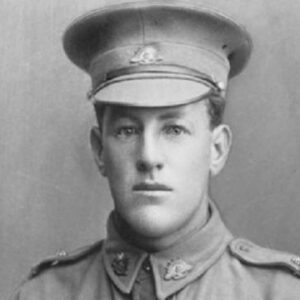Albert Jacka was an Australian soldier who was decorated for his bravery during the Gallipoli Campaign of World War I. He was given the Victoria Cross (VC) for his bravery, the highest honor for valor that members of the British and Commonwealth armed services may receive. During World War I, Jacka was the first Australian to be awarded the Victoria Cross. Throughout the conflict, he continued to show remarkable bravery and gained further honors. He grew up on a dairy farm as the son of a hardworking farmer and went on to work for the Victorian State Forests Department as a young man. When World War I broke out, he joined the Australian Imperial Force and underwent extensive training before being assigned to the Gallipoli Campaign. He shown amazing heroism amid a concerted Turkish assault to push the Australians into the sea, having already earned a reputation as a ferocious front-line soldier. He was given the Victoria Cross as a result of this occurrence, and he became a national hero. He became a businessman after the war. He never recovered from his wartime injuries, however, and died at the young age of 39.
Childhood and Adolescence
Albert Jacka was born on a dairy farm near Winchelsea, Victoria, on January 10, 1893. Nathaniel Jacka and his English-born wife Elizabeth (ee Kettle) had seven children, and he was the fourth.
He went to a local school for a few years before beginning to work. He began his career as a haulage contractor with his father before accepting a position with the Victorian State Forests Department.
A Career of Albert Jacka
In 1914, World War I broke out. Jacka enlisted in the Australian Imperial Force right away. He was assigned the rank of private and sent to Broadmeadows Camp for training.
Turkey became a German ally in the meantime, and Jacka’s battalion was dispatched to Alexandria. After ten weeks of intensive training in Cairo, the battalion was amalgamated with New Zealand brigades to form the New Zealand and Australian Division (NZ&A), which was commanded by Major General Alexander Godley.
Jacka rapidly developed a reputation as a fearsome front-line soldier due to his bravery.
In April 1915, his division arrived at Anzac Cove on the Gallipoli Peninsula for the Gallipoli Campaign. The Turks began a counter-offensive along a key stretch of the Anzac line on May 19, 1915. Following a frantic battle, some Turks were able to take a twelve-yard (11 m) piece of the trench.
Jacka was defending one of the trench’s ends when he came up with a strategy to get the Turks out. The Turks were hit with two bombs, and Jacka attacked them from behind. He bayoneted two Turks and shot five others. The remaining Turks were terrified and fled. His campaign actions made him a national hero, and he received numerous medals and prizes.
Following this event, Albert Jacka received rapid advancements. In short succession, he was promoted to corporal, sergeant, and company sergeant major. He oversaw extensive combat as the company sergeant major of C Company in Gallipoli, where his regiment took part in an Allied advance. Jacka’s regiment was withdrawn to Egypt after nine months of battle that resulted in the deaths of thousands of Australians.
After passing officer training school with flying colors, Jacka was commissioned as a second lieutenant in April 1916. In August of that year, he was advanced to lieutenant, and in March of 1917, he was promoted to captain.
By early 1917, the Germans had retreated behind the Hindenburg Line. Jacka conducted a risky night reconnaissance expedition into “no man’s land” at Bullecourt in April of that year to inspect enemy defenses. He single-handedly caught two Germans in the process and was well commended for his bravery.
Jacka has been hurt numerous times during his military tenure. He was gassed and injured by a rocket in May 1918. He spent a long time in England recovering before returning to Australia. In January 1920, he was dismissed from the AIF.
He went on to become a businessman and was elected to the City of St Kilda Council in 1929. He was elected mayor the next year.
Major Projects of Albert Jacka
Because of his gallantry and courage during the Gallipoli Campaign in World War I, Albert Jacka became a national hero. After the Turks launched an attack on the Anzac Line and took a piece of the trench at Courtney’s Post, Jacka battled valiantly to defend the trench, shooting five Turkish men and bayoning two others.
Achievements & Awards
Albert Jacka was awarded the Victoria Cross, the highest military honor bestowed on members of the armed forces of Commonwealth countries for gallantry.
For his actions during the attack on Pozières, he was awarded the Military Cross. For his actions against the Germans in the Hindenburg Line, he was eventually given a Bar to his Military Cross.
Estimated Net Worth
Estimated net worth of Albert Jacka is unknown.
Personal History and Legacy
In 1921, Jacka married Frances Veronica Carey. A daughter was later adopted by the parents.
During his military career, he had sustained numerous injuries from which he never entirely healed. His health began to deteriorate while he was in his thirties, and he died on January 17, 1932, from chronic nephritis. He was only 39 years old when he died.


